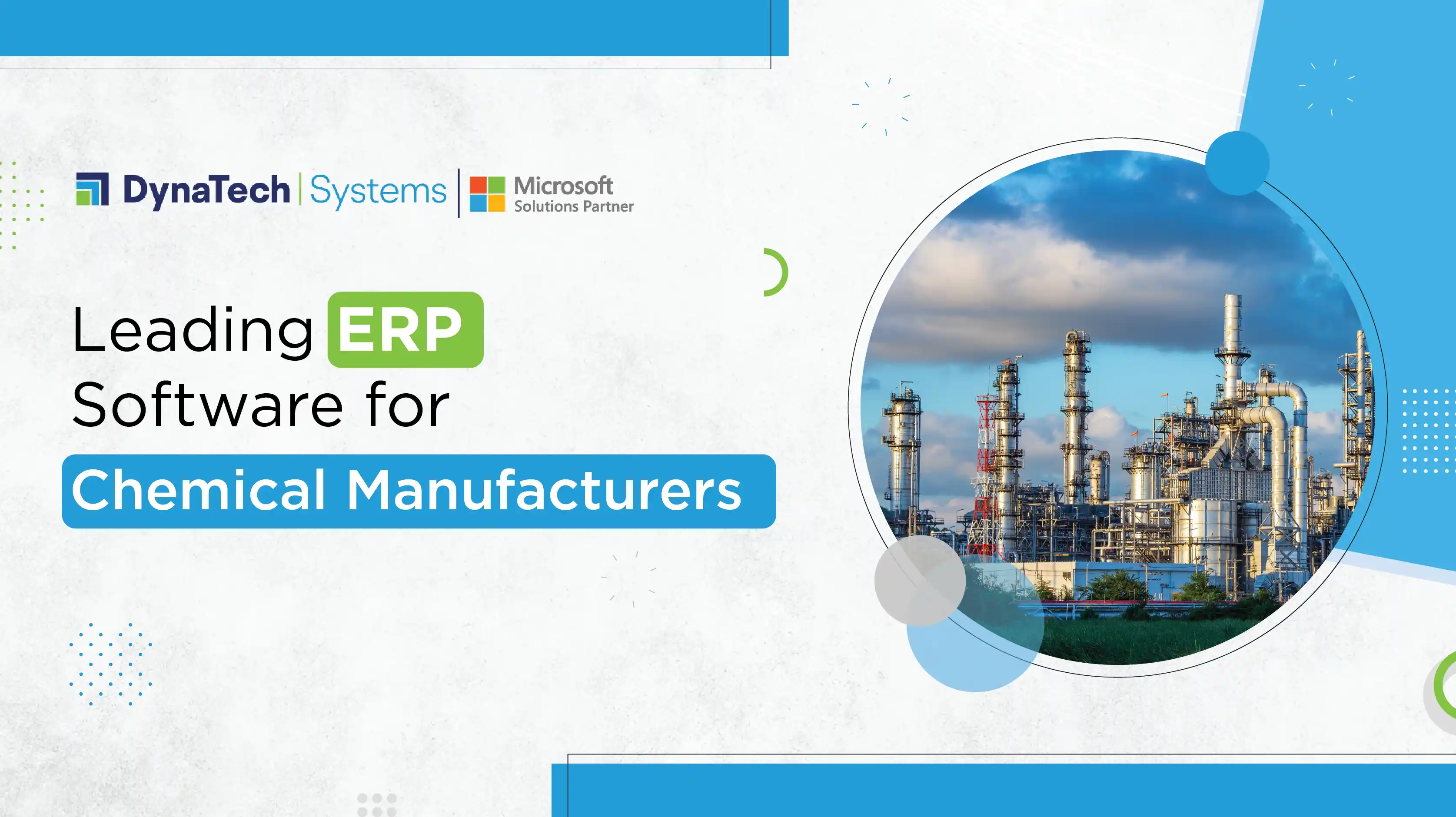The chemical manufacturing industry is no stranger to its fair share of setbacks. Right from managing hazardous materials and conserving batch production to ensuring regulatory compliance and tackling complicated supply chain processes, businesses in this industry often find themselves navigating a maze of operational hurdles. But imagine if there was a way to rationalize these processes without spending huge amounts of money and yet boosting efficiency all at once. That's what ERP (Enterprise Resource Planning) software is able to perform.
ERP systems are saviors of businesses as they centralize and automate multiple operations across an organization. For the chemical manufacturing sector, an ERP solution customized to the specific demands of the sector can be the key to unlocking seamless operations, improved productivity, and even long-term growth.
In this article, we will explore and understand why ERP software is a must-have for chemical manufacturers, unlock the prime features that make it especially advantageous, and highlight why Manufacturing ERP Software stands out as one of the most preferred solutions for businesses in this space. Let's get cracking on how the right ERP system can transform your operations and take your business to the next level.
What is Chemical Manufacturing ERP Software?
Chemical manufacturing ERP software is an exclusive tool created to fulfill the unique requirements of the chemical industry. It's not your typical ERP system—this software goes beyond standard business management by emphasizing the challenges chemical manufacturers face, like batch production, raw material inventory tracking, product traceability, and stringent regulatory compliance.
Unlike conventional ERPs, which can be too generic, this software is personalized to capture the complexities of producing chemicals, and manage hazardous substances, by maintaining top-notch product quality. Think of it as a central hub that brings together all elements of your business—from procurement and production to sales, inventory management, and finance—into one unified platform.
With this kind of ERP software, every step of your production process, right from sourcing raw materials to delivering the end product, can be monitored and optimized in real time. This helps chemical factories to rationalize managing workflows, elevate efficiency, and minimize costs—eventually making their chemical manufacturing operations absolutely effortless and pretty effective. Checkout below how ERP streamlines the entire chemical manufacturing process?
Key Features of ERP System for Chemical Manufacturing
1. Batch Production Management
In the domain of chemical manufacturing, batch production is the norm, and it comes with its own set of limitations. Chemical factories are supposed to have proper control over formulas, ingredients, and processes to keep track of required uniformity and quality. This is where a chemical manufacturing ERP system actually shines. It's specialized software to deal with the complexities of batch production by monitoring raw materials, optimizing production schedules, and ensuring that every batch meets the needed specifications.
What's another highlight? These systems make managing recipes and formulations a breeze. Chemical factories can feasibly adjust quantities or materials on the fly, all while ensuring that each production run maintains the required high-quality standards. This helps them to reduce wastage and ensure they are getting the most out of your materials, time, and resources.
2. Regulatory Compliance and Documentation
The chemical industry is one of the most highly regulated sectors, with stringent rules and safety regulations to adhere to. Manufacturers are constantly keeping up with regulations from bodies like REACH, OSHA, and the FDA—many of which require detailed documentation and uniform reporting.
Here's where the ERP system steps in to save the day. It takes the headache out of compliance by automating the regulatory reporting process, securely storing certifications, and monitoring safety data sheets (SDS). With built-in tools to manage compliance, an ERP system allows companies to stay on top of changing regulations, which minimizes the risk of penalties and fines. This means companies can focus more on growing their business and less on navigating the complexities of regulatory paperwork.
3. Supply Chain and Inventory Management
When it comes to the chemical manufacturing industry, taking care of raw materials and finished products is no small feat - especially when businesses are working with hazardous or perishable chemicals. It's a delicate balancing act that calls for precision. This is where ERP software becomes the superhero of chemical factories. It allows them to stay on top of inventory levels, maintain healthy supplier relationships, and simplify the whole procurement operation.
With real-time, accurate data at manufacturers' fingertips, they can get rid of the costly pitfalls of stockouts or overstocking, both of which can lead to production delays and unnecessary costs. No more worrying about running out of critical materials or holding on to excess stock that ties up valuable resources.
But it doesn't come to cease there. ERP systems allow companies to utilize the feature of traceability, meaning they can monitor each batch from its raw material origins all the way to the finished product. This is especially vital when it comes to product recalls—if anything goes opposite of the expectations, companies can easily pinpoint and isolate afflicted products, eliminate risks, and protect their brand. It's all about ensuring efficiency, safety, and peace of mind throughout the supply chain.
4. Cost Management and Financial Control
When it comes to the chemical manufacturing domain, costs can fluctuate unexpectedly—whether it is about material prices, labor expenses, or overheads. Hence, keeping a tight grip on finances is instrumental for staying profitable. You can also check how much does an ERP software can cost you as per your business need. ERP systems for chemical manufacturing come equipped with a set of robust and scalable financial management tools that enable companies to keep track of material costs, labor, and other miscellaneous expenses in real time, which significantly helps them ensure strict control over profitability.
With the capability to create quick financial reports and monitor expenses across all departments, ERP software make it a cakewalk for businesses to check where their finance is going and adjust in that accordance. This visibility into financial data empowers manufacturers to make shrewd, more astute decisions about production, budget, and cost management tactics, which eventually helps them optimize operations and boost their bottom line.
Wrapping Words
In the chemical manufacturing domain, where every minute detail has its specified place, and compliance is non-negotiable, an ERP system doesn't stand as a plan B—it's a must-have. These ERP software not only automate intricate operations but also help chemical industries with real-time invaluable insights that empower them to gain a competitive edge. Right from ensuring regulatory compliance to amplifying operational efficiency, the ideal ERP is capable of showing the way out of the risks and driving tangible improvements across the board.
Being a part of this ever-evolving chemical manufacturing industry, opting for an ideal ERP system is far ahead of just a technical decision—it's a well-thought-out action that positions companies for future development and success. Furthermore, investing in Microsoft Dynamics for Chemicals is not just about resolving prevailing industry-specific barriers but setting up your organization for long-term sustainability and leadership in the current market landscape.
For chemical manufacturers in the quest for scalable and adaptable solutions, Microsoft Dynamics 365 offers an exceptional platform that is custom-built for the set of challenges of this industry. With its user-friendly interface, scalability, and extensive set of features, it empowers businesses to rationalize operations and make data-powered decisions, which allows them to stay ahead of the competition.




























